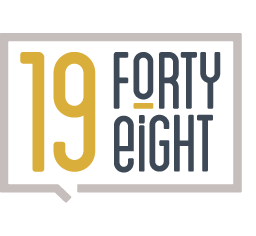By Simon Coleman, Actor and Co-founder of 1948
The fear of public speaking affects millions of people worldwide.
Despite my outer confidence, I have experienced it myself, and I know many other actors who have this deep-rooted fear.
Otherwise known as glossophobia, it manifests itself in various ways, from mild nervousness and sweaty palms, to full-blown panic attacks – like the one I had before going on stage at the Royal National Theatre in London many years ago. Thankfully, I knew how to overcome this fear and managed to get myself back on track.
Whether it is presenting at a team meeting, speaking at a conference or delivering a keynote speech, the fear of public speaking can be debilitating.
The Nature of the Fear
At its core, the fear of public speaking stems from anxiety about being judged by others. We are inherently social creatures, and our survival historically depended on the approval and acceptance of others in a tribe or community. This instinctive need to belong and fear of rejection translates into modern situations, where public speaking represents an opportunity to be judged by others.
The fear is often triggered by the idea of making mistakes in front of others, which can lead to embarrassment or rejection. The anticipation of this judgment can be so overwhelming that it makes us avoid situations where we might be required to address a group.
The fear is particularly pronounced where there has been some kind of previous negative experience with public speaking, such as forgetting words or receiving unkind feedback.
The pressure to perform perfectly can overwhelm the speaker, leading them to believe that anything less than perfection is a sign of incompetence.
Social comparison is another factor that exacerbates the fear of public speaking. People often compare themselves to others, especially those who are confident and well-spoken. This comparison leads to feelings of inadequacy, as they believe their abilities fall short of others.
The fear can manifest itself in several forms, including dry mouth, trembling, sweating, rapid heart rate and even nausea. These physical symptoms of anxiety create a vicious cycle: the more we focus on the anxiety and physical sensations, the more intense the fear becomes. Over time, this anxiety can be compounded by the anticipation of future speaking events, creating a heightened sense of dread.
The Physiological Response to Public Speaking
When faced with a speaking opportunity, the body goes into “fight-or-flight” mode. This survival mechanism, activated by the brain’s amygdala, prepares the body to deal with a perceived threat. In the case of public speaking, the perceived threat is the fear of being judged negatively. As a result, the body releases stress hormones like adrenaline and cortisol, which trigger unwanted physiological responses such as increased heart rate, shallow breathing, and muscle tension.
This response is designed to help the body respond quickly to danger, but when the threat is psychological, it can be counterproductive. Rather than enhancing performance, it hinders it, making it difficult for the speaker to think clearly or maintain control over their speech.
Overcoming the Fear of Public Speaking
Fortunately, the fear of public speaking is not insurmountable and, with the right training and practice, many people end up thriving in the spotlight.
As an actor, I have spent decades learning techniques that allow me to perform at my best, even when the fear kicks in. I still get nervous when I’m delivering a new training course for the first time or when I’m pitching for an important piece of work, but I doesn’t stop me from doing what I need to do.
Here are a few tips to help you along the way:
- Preparation and Practice: Knowing your material inside will allow you to feel more confident and less reliant on notes or scripts. Practicing the speech in front of a mirror, recording yourself, or presenting to a small group of friends or family can help build confidence. The more familiar you are with the content and articulation of the words, the less room there is for fear to take hold.
- Reframing Mistakes: Change your mindset about mistakes. Instead of seeing them as failures, view them as opportunities for growth and learning. Everyone makes mistakes, even experienced speakers, and acknowledging this fact can relieve the pressure to be perfect. The ability to recover from mistakes with grace and humour can actually endear a speaker to their audience, making the experience more authentic.
- Vocal Control: Think about your pace and slow down, then slow it down again. And again. The slower you speak, the more time you have to think about what you are saying. You will sound more credible and will be less likely to make mistakes. It will also give you time to breathe, which in turn will calm you down.
- Conscious Breathing: This is one of the most important tools you have to help you overcome your fear of public speaking. Don’t let your breath control you, you must control your breath. Everyone thinks they know how to breathe and of course they do so unconsciously. But when it comes to conscious breathing it’s a very different ball game. I spent four years at drama school learning how to breathe properly and I now teach people to do the same. It’s a game changer for public speaking.
- Visualisation Techniques: Visualization techniques, such as imagining a successful presentation or visualizing the audience as supportive and friendly, can also help ease anxiety.
Conclusion
The fear of public speaking is a deeply ingrained anxiety that affects many people across different walks of life. By learning techniques to manage this fear, people can unlock their potential and become more comfortable with speaking in front of others, transforming a source of dread to an opportunity for growth and connection.
To find out more about our services click here or contact [email protected]


